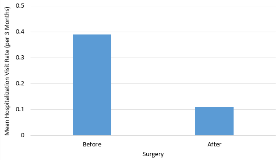Impact of Epilepsy Surgery on Healthcare Utilization in Pediatric Patients With Medically Refractory Epilepsy
Abstract number :
2.410
Submission category :
15. Practice Resources
Year :
2018
Submission ID :
502253
Source :
www.aesnet.org
Presentation date :
12/2/2018 4:04:48 PM
Published date :
Nov 5, 2018, 18:00 PM
Authors :
Ruta Yardi, Cleveland Clinic; Raluca Pana, Cleveland Clinic; Brittany Lapin, Cleveland Clinic Foundation; Imad Najm, Cleveland Clinic; William Bingaman, Cleveland Clinic; Jorge A. Gonzalez-Martinez, Epilepsy Center, Neurological Institute, Cleveland Clini
Rationale: A million people are seen annually in the emergency room(ER) for seizures or epilepsy in the United States. Furthermore, the average length of hospitalization in epilepsy patients has been reported to be 5.4 days with an associated cost of $6656 /day. Both of these incur a tremendous burden on healthcare costs. Several studies have tried to identify factors impacting health care costs, however only a few have studied interventions to reduce these costs.Our aim was to investigate the impact of epilepsy surgery in pediatric patients with medically refractory epilepsy on the number of ER and hospital admissions after surgery. Methods: We included pediatric patients who underwent epilepsy surgery at Cleveland clinic from January 2009 to December 2017, with a minimum postoperative follow up of 6 months. Data was collected using the knowledge program database, which includes self-reported information filled out by patients prior to their clinic visits. We recorded the number of ER visits and hospitalizations 3 months prior to epilepsy surgery and 3 months preceding their most recent follow up. Statistical analysis was done using R statistical software. Results: A total of 194 patients were included. Median duration of follow up after surgery was 14 months. The number of hospitalizations decreased from a mean of 0.39 in the 3 months preceding surgery to a mean of 0.11 after surgery (p<0.001), with a 72% reduction in hospitalization frequency. There was also a significant reduction in the frequency of ER visits from a mean of 0.26 visits in the 3 months preceding surgery to 0.05 after surgery (p<0.001), an 81% reduction in frequency of ER visits. Conclusions: Our study shows that there is a significant decrease in the number of both ER visits and hospitalizations after epilepsy surgery in pediatric patients with medically intractable epilepsy.This provides evidence to support a favorable impact of surgery on healthcare utilization. Funding: No funding or disclosures

.tmb-.png?Culture=en&sfvrsn=1f2904c0_0)